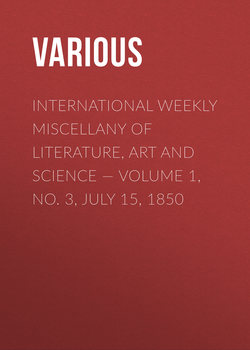Читать книгу International Weekly Miscellany of Literature, Art and Science — Volume 1, No. 3, July 15, 1850 - Various - Страница 5
THE PHANTOM WORLD. 1
ОглавлениеMR. CHRISTMAS, in his "Twin Giants," attacked the stronghold of popular superstition by exhibiting the foundations and growth of error in the early and ignorant ages, and of the progressive dissipation of these delusions as the light of history and science spread over the world. The present work is a translation from Calmet. It deals with spectres, vampyres, and all that tribe of visionary monsters. We have here the learning and opinion of the enlightened portion of the world a century ago. M. Calmet traversed all history for his facts, and gives us a mass of monkish inventions, which prove to what an extent the Romish church fostered superstition for its own purposes. We have dead men called from their graves to show the danger of neglecting to pay tithes, and to rivet on the rich the necessity of building churches, and paying liberally for masses. At p. 286 of vol. 1 we have a proof that the "knockings" which have made so much noise in the United States, are no novelty:—
"Humbert Birk, a burgess of note in the town of Oppenheim, had a country-house, called Berenbach. He died in the month of November, 1620, a few days before the feast of St. Martin. On the Saturday which followed his funeral they began to hear certain noises in the house where he had lived with his first wife; for at the time of his death he had married again. The master of this house, suspecting that it was his brother-in-law who haunted it, said to him: 'If you are Humbert, my brother-in-law, strike three times against the wall.' At the same time they heard three strokes only, for ordinarily he struck several times. Sometimes, also, he was heard at the fountain where they went for water, and he frightened all the neighborhood. He did not utter articulate sounds; but he would knock repeatedly, make a noise, or a groan or a shrill whistle, or sounds as of a person in lamentation."
This went on, at intervals, for a year, when the ghost found a voice, and told them to tell the cure to come there; and when he came he said he wanted three masses said for him, and alms given to the poor. The author has the following sensible observations on the modes in which ghost stories originate:—
"We call to our assistance the artifices of the charlatans, who do so many things which pass for supernatural in the eyes of the ignorant. Philosophers, by means of certain glasses, and what are called magic lanterns; by optical secrets, sympathetic powders: by their phosphorus, and, lately, by means of the electric machine, show us an infinite number of things which the simpletons take for magic, because they know not how they are produced. Eyes that are diseased do not see things as others see them, or else behold them differently. A drunken man will see objects double; to one who has the jaundice they will appear yellow: in the obscurity people fancy they see a spectre, where there is but the trunk of a tree.
"A mountebank will appear to eat a sword; mother will vomit coals, or pebbles. One will drink wine, and send it out again at his forehead; another will cut off his companion's head, and put it on again. You will think you see a chicken dragging a beam. The mountebank will swallow fire, and vomit it forth; he will draw blood from fruit; he will send from his mouth strings of iron nails; he will put a sword on his stomach, and press it strongly, and instead of running into him, it will bend back to the hilt. Another will run a sword through his body without wounding himself. You will sometimes see a child without a head, then a head without a child and all of them alive. That appears very wonderful; nevertheless, if it were known how all these things are done, people would only laugh, and be surprised that they could wonder at and admire such things."
If we are so easily deceived in these matters, is it strange that in peculiar states of mind or body, we are so completely imposed on in others? At p. 353 we have the story on which Goethe has founded a singular exploit of Mephistopheles in the cellar of Auerbach.
"John Faust Cudlington, a German, was requested, in a company of gay people, to perform in their presence some tricks of his trade. He promised to show them a vine loaded with grapes, ripe and ready to gather. They thought, as it was the month of December, he could not execute his promise. He strongly recommended them not to stir from their places, and not to lift up their hands to cut the grapes, unless by his express order. The vine appeared directly, covered with leaves and loaded with grapes, to the astonishment of all present. Every one took up his knife, awaiting the order of Cudlington to cut some grapes; but after having kept them some time in that expectation, he suddenly caused the vine and the grapes to disappear. Then every one found himself armed with his knife, and holding his neighbor's nose with one hand; so that if they had cut off a bunch without the order of Cudlington, they would have cut off one another's noses."
The book is curious and interesting and calculated to do away with much of the superstition which now appears to be gaining ground in almost every part of Christendom.
